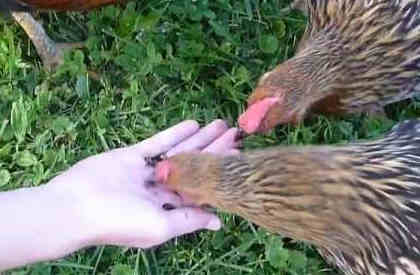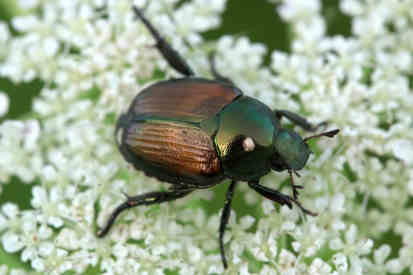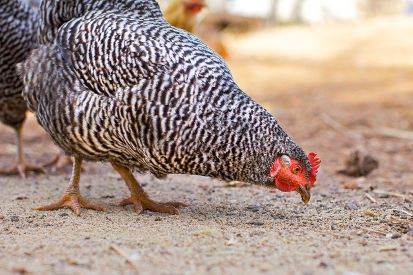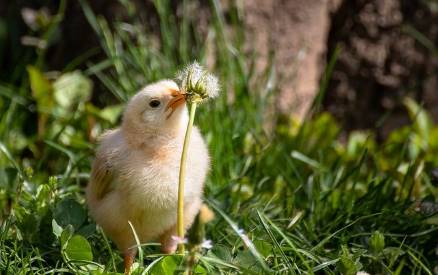Do chickens eat Japanese beetles? Yes, chickens can eat Japanese beetles. Chickens are omnivores and often eat insects, including Japanese beetles. Bugs and insects are a large part of a chicken’s natural diet, so it is not uncommon for chickens to enjoy snacking on Japanese beetles.
Japanese beetles are a common garden pest, and they can do a lot of damage to your plants. But chickens love to eat them! Not only are they a good source of nutrients for your chickens, but they can also help reduce the damage they do to your plants.
Here’s everything you need to know about chickens and Japanese beetles.

What are Japanese beetles?
Japanese beetles are a type of scarab beetle that is native to Japan. They were first introduced to North America in 1916 and have been wreaking havoc on gardens ever since. These pests are particularly fond of roses, grapes, and lettuce, but they feed on just about any plant.
Japanese beetles typically lay their eggs in the soil in late summer or early fall. The larvae hatch in the spring and spend the next few months eating their way through your garden before emerging as adults in late May or early June.
[ChickenAffiliate]
Do chickens eat Japanese beetles?
Chickens love to eat Japanese beetles! In fact, they consider them to be a delicacy. Not only will chickens help rid your garden of these pesky pests, but they will also provide you with a good source of nutrition.
Chickens need a diet high in protein, and Japanese beetles are an excellent source of this vital nutrient. So, not only will chickens help protect your plants from damage, but they will also help keep your flock healthy and well-nourished.
Are Japanese beetles dangerous to chickens?

Fortunately, Japanese beetles don’t pose any risk to chickens and are quite safe for them. Japanese beetles may look intimidating with their tough exteriors and large antennae, but they don’t bite or sting chickens, so there’s no need to worry.
Furthermore, these insects aren’t toxic for chickens if ingested; however, it’s important to note that the larvae of Japanese beetles – known as grubs – could potentially be dangerous if eaten in large quantities. Since it’s unlikely that your chickens will snack on grubs, you can confidently keep them in your garden, knowing that Japanese beetles are safe.
Despite their appearance, you can rest assured that these unique little bugs won’t harm your birds in any way.
The benefits of eating Japanese beetles for chickens
If you own chickens, you may have noticed that they love to eat bugs. Japanese beetles are no exception. These pesky little creatures can be beneficial for your chickens. Here are 5 reasons you should let your chickens feast on Japanese beetles.
Good source of protein
Japanese beetles are an excellent source of protein for your chickens, providing them with the vital nutrients they need to stay healthy. They also contain a good amount of calcium, which is essential for strong bones and eggshells.
Help keep your chickens’ immune systems strong
In addition to being a high-protein snack, Japanese beetles also contain high levels of essential vitamins and minerals that help strengthen your chickens’ immune systems. Eating these insects can help your chickens fight off illnesses and stay healthy.
Help increase the fertility of your chickens
Eating Japanese beetles can also help increase the fertility of your chickens. These insects are rich in zinc and other important minerals for healthy egg production.
Help reduce stress in your chickens
If your chickens are feeling stressed due to overcrowding or other issues, they can benefit from eating Japanese beetles. These insects contain tryptophan, which helps reduce stress levels in chickens.
Help keep your chickens’ coop clean and free of pests
Finally, by allowing your chickens to snack on Japanese beetles, you can help keep your coop clean and free of pests. Your chickens will eliminate the beetles before they can lay eggs, and the larvae won’t have a chance to hatch.
Things to watch out for when feeding Japanese beetles to chickens

Although Japanese beetles are generally safe for chickens, there are a few things to watch out for when feeding them.
Don’t let them eat too many
First, try to avoid letting your chickens eat too many at once. Eating large amounts of these insects can make them sick, so it’s important to keep an eye on how much they eat.
Don’t let them eat grubs
Also, the larvae of Japanese beetles – known as grubs – could potentially be dangerous if eaten in large quantities. So, avoid letting your chickens eat any grubs they find while foraging.
How often should chickens eat Japanese beetles?
Japanese beetles are an excellent source of protein and other essential vitamins and minerals for chickens, so they can be a great addition to their diet.
There’s not much chance of your chicken eating too many of these insects, so you can generally let them snack on them as often as they like. However, you should always monitor their behavior and ensure they eat only a few.
How to prepare Japanese beetles for feeding to chickens
Japanese beetles don’t need to be cooked or otherwise prepared before being fed to chickens. However, if you do want to make them easier for your birds to eat, there are a few things you can do.
You can crush the beetles or mash them up into a paste to make them easier for chickens to consume. You can also mix them with other food, such as sunflower seeds or mealworms.
The best way for chickens to eat Japanese beetles is to let them find and catch them while they are foraging. This is a great way to give them a natural and nutritious snack, as well as allow them to get some exercise.
Do baby chickens eat Japanese beetles?

Yes, baby chicks love Japanese beetles as much as their adult counterparts. They are a great source of protein and other essential nutrients for chicks and can help them stay healthy.
However, it’s important to supervise baby chickens while eating Japanese beetles. They may not be able to eat them as quickly or safely as adult chickens, so it’s best to ensure they don’t ingest too many at a time.
What other bugs and insects can chickens eat?
Most people know that chickens love to eat bugs, but did you know that chickens can eat many different types of bugs and insects? Here are 5 of the most popular options.
Cicadas
Cicadas are a flying insect that chickens love to eat. They are relatively easy to catch and are a good protein source for your chickens.
Read More: Do Chickens Eat Cicadas? 5 Excellent Benefits
Hornworms
Hornworms are the larvae of moths, and they make an excellent treat for your chickens. They are high in protein and are also a good source of calcium.
Read More: Can Chickens Eat Hornworms? 5 Surprising Benefits
Slugs
Slugs may not be the most appetizing insect for humans, but chickens love them! They are a good source of moisture and contain a lot of protein.
Read More: Do Chickens Eat Slugs? Yes, With Some Risks
Ants
Ants are another insect that is relatively easy for chickens to catch. They are high in protein and fat, making them an excellent treat for your chickens.
Read More: Do Chickens Eat Ants? 5 Awesome Benefits
Spiders
Spiders may be small, but they pack a big punch when it comes to nutrition. They are high in protein and fat and contain a good amount of iron.
Read More: Do Chickens Eat Spiders? 4 Excellent Benefits
How to give chickens a healthy and balanced diet
A healthy diet for a chicken includes a mix of carbohydrates, proteins, fats, vitamins, and minerals. Here are some tips on how to give your chickens the nutrients they need.
Carbohydrates
Carbohydrates are an essential energy source for chickens. Chickens can get carbohydrates from eating grains such as wheat, corn, and oats. You can also give your chickens vegetables such as potatoes, carrots, and peas.
Proteins
Proteins are essential for chicken growth and development. Chickens can get proteins from eating bugs, worms, and other insects. You can also give them animal-based proteins such as eggs, meat, and milk.
Fats
Fats help chickens stay warm in cold weather and provide them with energy. Chickens can get fats from eating seeds, nuts, and insect larvae.
Vitamins
Vitamins help chickens stay healthy and prevent disease. Chickens can get vitamins from eating dark green leafy vegetables such as kale and spinach. You can also give your chickens fruits such as oranges and tomatoes.
Minerals
Minerals are necessary for many vital chicken functions, such as egg production and feather growth. Chickens can get minerals from eating dirt or grit. You can also give your chickens mineral supplements that you can buy at a feed store.
Do chickens eat Japanese beetles – final thoughts
If you have a problem with Japanese beetles in your garden, consider letting some chickens loose. Not only will they enjoy feasting on these tasty little pests, but they will also help reduce the damage they do to your plants.
Chickens are a great natural way to control pests, so give them a try next time you’re dealing with these pesky critters.
Related Articles:
